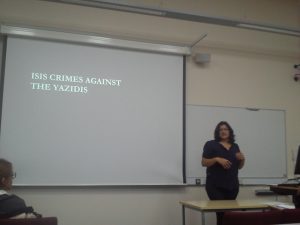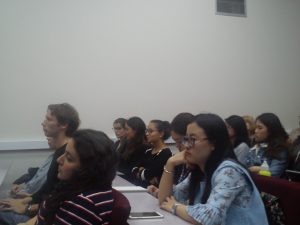 On Tuesday 2 October 2016, Kent Law School’s Centre for Critical International Law (‘CeCIL’) kicked off the 2016-17 academic year with an incredibly articulate and powerful talk by Sareta Ashraph, an experienced international legal practitioner currently serving as the Chief Analyst of the Commission of Inquiry on Syria. With this year’s CeCIL theme being vulnerability and resistance, it is difficult to imagine a more fitting subject than the one detailed in Sareta’s talk entitled ‘Investigating Genocide: ISIS Crimes Against the Yazidis.’ Given that so much commentary on ISIS’s ongoing campaign of extreme violence is plagued by a volatile mixture of emotive force, contextual misrepresentation, and utility for numerous political polemics, Sareta’s presentation of the issues in manner that combined on-the-ground experience with sober (not to mention sobering) legal analysis provided a valuable perspective on one of the most troubling issues of our time.
On Tuesday 2 October 2016, Kent Law School’s Centre for Critical International Law (‘CeCIL’) kicked off the 2016-17 academic year with an incredibly articulate and powerful talk by Sareta Ashraph, an experienced international legal practitioner currently serving as the Chief Analyst of the Commission of Inquiry on Syria. With this year’s CeCIL theme being vulnerability and resistance, it is difficult to imagine a more fitting subject than the one detailed in Sareta’s talk entitled ‘Investigating Genocide: ISIS Crimes Against the Yazidis.’ Given that so much commentary on ISIS’s ongoing campaign of extreme violence is plagued by a volatile mixture of emotive force, contextual misrepresentation, and utility for numerous political polemics, Sareta’s presentation of the issues in manner that combined on-the-ground experience with sober (not to mention sobering) legal analysis provided a valuable perspective on one of the most troubling issues of our time.
In the course of her talk Sareta directly confronted numerous cliches and oversights regarding both the international crime of genocide and the Yazidis themselves in relation to this crime. This included problematising the popular perception of genocide being equated to mass killings analogous to the Nazi Holocaust. Rather, it was made clear that genocide is the elimination of a protected group identity (with the Yazidis meeting this definition as a religious group) and by preventing births, transferring children, and other policies of forced assimilation, it is possible to commit genocide without killing a single individual so long as the requisite intent is present. From this premise, it was shown how ISIS’s actions towards the Yazidis, including forced conversions, the sexual slavery of women and girls, and the forced conscription of young boy into the ranks of ISIS’s future fighters, render ISIS culpable under every definition of genocide listed in the Genocide Convention. Furthermore, attention was given to the Yazidis’ specific vulnerability to genocide resulting from historical and cultural factors. For instance, the Yazidis’ pre-monotheistic religious tradition has been the source of much historical persecution that inform the present through ISIS’s condemnation of them as ‘devil worshipers.’ Additionally, given that Yazidi identity requires both parents to be Yazidi, the group particularly susceptible to genocidal interference.
inform the present through ISIS’s condemnation of them as ‘devil worshipers.’ Additionally, given that Yazidi identity requires both parents to be Yazidi, the group particularly susceptible to genocidal interference.
While steadfast in her legal analysis, Sareta was without illusion when addressing the substantial political barriers in place to achieving a just outcome in this very difficult case. For example, on the question of bringing international criminal proceedings against ISIS, via the International Criminal Court or otherwise, while condemnation of ISIS is widespread across actors with differing ideologies, this cannot be abstracted from the larger conflict raging in the region. Here seeking justice for ISIS’s victims would raise the more politically controversial question of justice for the victims of the Assad regime. Furthermore, Sareta linked this to the problematic that is the normative prioritising of international crimes for political purposes. After all, crimes against humanity have been occurring on a massive scale throughout the duration of this meta-conflict and assertions that genocide is objectively worse than crimes against humanity is a deeply difficult position to hold. While there are no easy answers to these questions and facts on the ground are shifting daily we can be thankful to Sareta for providing us with a conceptual entry point for approaching these comprehension defying events. I have every reason to believe that her talk has set an excellent pace for a fascinating year of CeCIL events to come.
